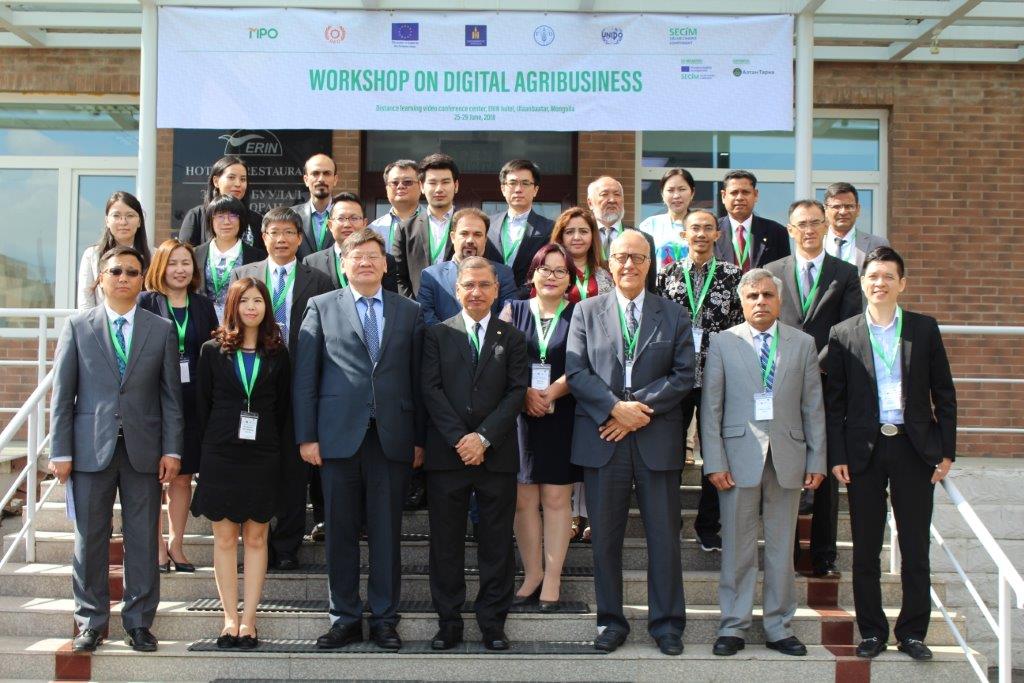
Select Page
The Asian Productivity Organization (APO) concluded a five-day workshop on Digital Agribusiness, 25–29 June 2018 in Mongolia. The workshop in Ulaanbaatar was attended by 20 participants from nine APO member countries and six resource persons from Canada, the Republic of China, Hong Kong, and Mongolia.
The workshop aimed to create awareness of global trends in digital technologies and their impact on agribusiness. It also focused on digital technologies and applications used in agribusiness globally, enabling participants to formulate strategic recommendations and action plans for promoting their adoption and scaling up technology-assisted best practices in the sector.

In his opening remarks, Head of SME Department State Secretary Erdene Saikhan of Mongolia’s Ministry of Food, Agriculture and Light Industry said that the government had created a long-term policy for the sustainable development of the agriculture sector. He also reported that Mongolia had started introducing systematic reforms and innovations in livestock and crop production as well as the processing industry.
“In order to attain this goal, the Government of Mongolia is currently working on the introduction of new, advanced technology, innovation, its localization, implementing technical renovation, setting the foundation for the knowledge-driven economy by developing high technology in new sectors, and creating proper policies that will regulate the cooperation between government and the private sector. These are all related to digital agribusiness,” he stressed.
Welcoming the participants, Chairman of the Board of Directors, Mongolian Productivity Organization, and APO Director for Mongolia Yamaaranz Erkhembayar, emphasized that agriculture was an important sector for national development and growth. “Agriculture accounts for 20.6% of Mongolia’s gross domestic product and 30.4% of the labor force. With the APO as a partner, we have been taking initiatives and implementing projects to promote the productivity movement in the food and agriculture sector.”
FAO Representative in Mongolia Mustapha Sinaceur pointed out that the main objective of the FAO SECiM C2 Project “Increase of employment in Mongolia (Component 2): Develop a value chain for animal-derived products and vegetable production with the participation of the private sector” was to identify potential value chain solutions, along with methodologies and initiatives for enhancing productivity and competitiveness in agriculture. “Digital technology is significantly affecting all sectors of the economy and agriculture is no exception. Farmers and food producers must embrace digital transformation trends. By using technology as a sustainable, scalable resource, we will be able to improve productivity, ensure faster times to market, operate a streamlined supply chain, and reduce the cost of operations,” he stated.
Giving the inaugural address, APO Agriculture Department Director Dr. Muhammad Saeed pointed out that digital technology could help agribusinesses keep up with the growing demand for agricultural and food products to feed, fuel, and fortify about 10 billion people worldwide by 2050. “This technology can have major impacts across agribusiness value chains. It will enable enterprises to enhance competitiveness, improve margins, manage producer relationships better, and provide better service to customers,” he said.
“Digitization offers customers more information about where food comes from and how it is processed, enabling them to make informed choices. It is also beneficial for upgrading agribusiness in rural areas and creating new methods to feed the world. Digital technology, particularly Internet of Things (IoT) technology, can be used to enhance agribusinesses in rural Asia and around the world. The IoT, data, and connectivity can make powerful contributions to increasing the sustainability and competitiveness of Asian agribusinesses,” noted Dr. Saeed.
He also stressed that there was an urgent need to explore precision agriculture and use of big data, digital-commerce, and digital tracking and traceability tools to increase sustainable productivity in agriculture sector in APO member countries. “The use of data and connectivity for driving product and service innovation, creating new business models, and improving brands will be critical. Applications of technology in these areas will be game-changers, and any business neglecting them will be at a significant competitive disadvantage,” he concluded.
The workshop format included presentations by experts, sharing of experience by participants, field and company visits, and group breakout sessions, including the formulation of recommendations and follow-up action plans.

Photos: Mongolian Productivity Organization